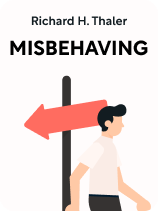

This article is an excerpt from the Shortform book guide to "Misbehaving" by Richard H. Thaler. Shortform has the world's best summaries and analyses of books you should be reading.
Like this article? Sign up for a free trial here.
Should fairness be accounted for in economics? How does fairness conflict with budget optimization?
Economist Richard H. Thaler argues that consumers are concerned with fairness and cooperation, even when these concerns get in the way of their budget. This is shown by two experiments: the ultimatum game and the prisoner’s dilemma.
Discover why fairness in economics doesn’t always have a happy ending.
Experiment #1: The Ultimatum Game
Thaler argues that the ultimatum game reveals that consumers are concerned with fairness in economics, even at the expense of budget optimization. The ultimatum game, he explains, features two players and a fixed amount of money ($10, in his initial experiment). One player, the Proposer, is allowed to propose how the money should be distributed between the two players—the Proposer may, for instance, propose keeping $8 and giving the other player $2. The other player, the Responder, is allowed to accept or reject the Proposer’s offer, with the caveat that rejecting the offer means neither player gets any money.
(Shortform note: While the classical ultimatum game features only two players, economists have also invented other variants that feature more than two players. For example, the pirate game features five players, ranked in seniority from A through E, who have found a treasure of 100 gold coins. The most senior player proposes a distribution of the coins, and if the majority of players approve the distribution it takes effect; if not, that player is thrown overboard and the next player proposes a distribution. This process continues until only one player remains or a proposed distribution is accepted.)
As Thaler explains, if Responders were solely concerned with budget optimization, they should take any offer that the Proposer makes. After all, $2 is better for economic purposes than $0, even if accepting a $2 offer means the Proposer gets $8. In reality, however, Responders often rejected offers they deemed unfair—they typically rejected offers below 20% of the pie. Moreover, Thaler notes that even when researchers ran the ultimatum game with larger pies in impoverished countries, where the stakes are exponentially higher, the results were the same: Responders typically reject offers below 20%, even when the pie is equivalent to three months’ income.
(Shortform note: The importance of fairness in the ultimatum game isn’t just limited to humans. Researchers have performed versions of the ultimatum game with chimpanzees and found similar results: Chimpanzees often reject offers deemed unfair and prefer an even split between the Proposer and the Responder. For this reason, these researchers hypothesize that our concern for fairness has evolutionary roots that we share with chimpanzees.)
Experiment #2: The Prisoner’s Dilemma
In a similar vein, Thaler argues that variants of the prisoner’s dilemma suggest that individuals often prefer cooperating with others over maximizing their own well-being. Thaler explains that, in the classical prisoner’s dilemma, two prisoners arrested for collaborating on a crime are interrogated and allowed to inform on their collaborator or remain silent. If both prisoners remain silent, they will only spend one year in jail for a small infraction; if both prisoners inform on each other, they will each spend five years in prison; and if one prisoner informs but the other doesn’t, then the informer will get off scot-free while the other will spend 10 years in prison.
As Thaler relates, if the traditional economic assumption that individuals maximize their own well-being were true, both prisoners would inform on each other. To see why, imagine that you’re one of the two prisoners. Logically, there are two options: Either your collaborator will inform on you, or they won’t. If they do inform on you, you should likewise inform on them, since doing so would reduce your sentence from 10 years to five years. If they don’t inform on you, you should still inform on them, since doing so would reduce your sentence from one year to zero years. Regardless, standard economic theory dictates that you should inform.
However, Thaler says, when variants of the prisoner’s dilemma are performed in the laboratory, we find a different result: 40-50% of prisoners (that is, those playing the role of prisoners) refuse to inform on each other, instead remaining silent even if it means spending a year in jail. Thus, it seems that prisoners are interested in cooperating with each other, even though standard economic theory says that cooperation is irrelevant.

———End of Preview———
Like what you just read? Read the rest of the world's best book summary and analysis of Richard H. Thaler's "Misbehaving" at Shortform.
Here's what you'll find in our full Misbehaving summary:
- Why the theory of traditional economics rests on a faulty foundation
- How consumers actually behave in economic situations
- Real-world cases of behavioral economics helping consumers






